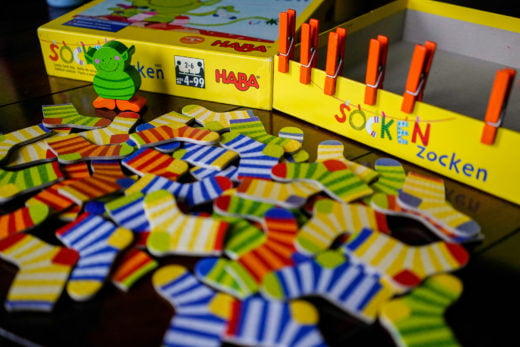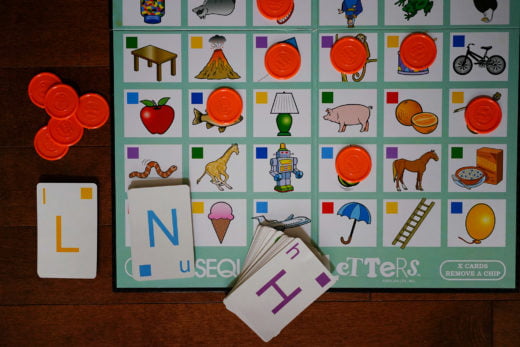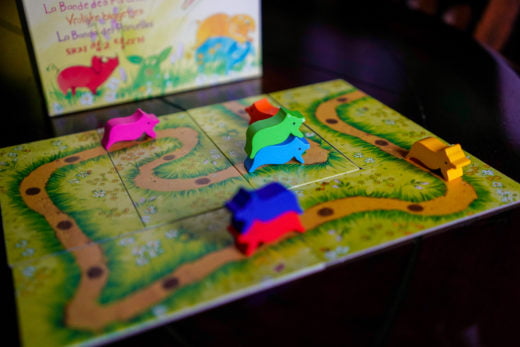Previously we discussed the opportunities board games provide children to develop socially. Often these are the more obvious benefits of game playing. However the bodies of research continue to grow in support of games correlating positively with improved critical thinking and overall cognition.
*****
COGNITIVE DEVELOPMENT
We have all heard the claims that games and puzzles improve our brain power. Classic neuroscience studies have always involved small games to study memory and cognitive improvement, often involving subjects with deficient or declining neurological functions. Many childrens games are designed in a very similar manner to invoke memory strengthening and can be a strong tool in cultivating the developing mind. Here are some of the benefits our brains get from board games.
1) Attention Span
Toddler games are often bare bones simple. But the one thing they all provide is a place for a child to hone their concentration. It’s hard for a child to sit still and focus on one thing. Sometimes it feels like they have an endless source of energy and are bouncing here and there like Gummi Bears, but even at the age of 2 or 3 years old a short and simple game provides a place where they can concentrate on a task and have some calm play time with mom or dad.
2) Pattern Recognition
Another skill aimed at toddlers is pattern recognition. Early gamers often aren’t ready to read so games focus on memory, shapes, and colours. Games provide tasks in colour matching and shape identification. Again, simple tasks that allow the young child to concentrate and think.
A game that I like to introduce at a very young age is Lucky Sock Dip (aka Socken Zocken). A simple game where you are digging through socks trying to find matching pairs. It’s not as easy as you think.

3) Hand Eye Coordination
Fine motor dexterity is still developing at the early ages of 2 or 3 years, so moving those tiny board game bits from place to place is great practice and helps strengthen the neural loops in the motor centers of the nervous system. However, even us adults can be mighty clumsy at times and popular dexterity games, such as Jenga, really put our hand eye coordination to the test. It’s been argued that video games are a great activity to increase hand-eye coordination, but don’t count out board games in this category as well. Strengthening of neural reflexes enhance the speed and efficiency of processing information.
Rhino Hero is a popular game amongst kids and grown ups alike, where our dexterity skills are put to the test as we build a house of cards.
4) Literacy and Math
Without a doubt board games provide many opportunities for children to read on their own. Especially when they have cards that they have to keep hidden to themselves. A simple game like Sequence Letters can encourage letter recognition and phonics as young as 2 or 3 years old. It also shows them a direct link between letter and object (“C” and photo of a cow) very similar to a flash card but in a more fun and interactive manner.

Moreover, math often makes an appearance in games in small ways: adding dice, counting steps, distance measurements and comparative quantities. The simple act of moving a piece and counting out loud creates a sense of number sequence and an intuition of “how much” a number represents. For young children it helps to transition from counting in the sense of a memorized song towards a method of quantification. Numerous studies have shown that early introduction to these concepts predicts long term achievements in mathematics ((Laski and Siegler et al., 2013; Geary et al., 2011), a good foundation to encourage careers in STEM (Science, Technology, Engineering and Mathematics). Since kids are all so eager to win, they will excitedly add up their own scores to find out if they have won without any prompting.
As dry and lucky as Chutes and Ladders can be it does provide ample opportunity to count. It’s especially good because it numbers each step up to 100, encouraging counting further than the typical 1, 2, 3 steps a piece often takes. For older kids a number of card based games involve higher level math, such as Sleeping Queens, provide endless fun while hiding math in the game. One of my favourites is Secret Code 13+4 which involves lots of addition.
5) Problem Solving, Reasoning and Judgement
When kids are young, we as parents tend to dictate our children’s routine, telling them that it is time for bed, or this is what you are eating for lunch. In the real world life is full of tough decisions. Not everything is clear cut. Sometimes the options are equally good (do I want cake or ice cream for dessert?). Board games often provide a number of things you can do and it’s not alway obvious which ones are more beneficial. Games provide children some practice in judging relevance in a given situation. To be able to focus on something and choose to ignore the other options and applying their own reasoning as to why they made that decision.
In Piggyback Brigade you have two pieces to control in a race to finish. You need them both to get to the end. If you roll a 2, do you move the one in the lead further to the finish line, or move the one at the back to fall on top of an opponent, who may carry you when they move on their next turn. Which do you choose and why? Whatever you choose it’s great to encourage your children to talk about what they are doing and why. More so, you should explain why you make your decisions so they can slowly see the underlying strategy. In this way you are also teaching your kids to explain their reasoning verbally and to think about what they are doing.

6) Long Term Strategy
For the board game hobbyist, a major draw to board gaming is the puzzly aspect of it. The tough decision making and long term strategy to make the most optimal moves to victory. Chess is a great example where we need to think about future moves. We need to consider every single outcome of a situation. This is often the hardest aspect of board games for a child to grasp, but games can help sharpen those skills over time. Children infrequently consider the concept of time and what needs to be done in the very near future. Bed time is always a rush because they don’t want to stop what they are currently doing, not realizing that they still need time for bath and brushing before bed. We are often reminding them that if they want time to read a story before bed we first need to do these things now. In a game, they slowly learn how to plan their actions now in order to achieve something on their next turn. They will independently think about their goals, plan out the necessary moves, and execute. These coding principles help to understand how building a sequence of events will lead to a final goal.
Many games will incorporate these principles to some degree, but if you are looking for something particularly focused at coding principles, check out Robot Turtles.
*****
And the final benefit of board games for kids … it’s fun for the whole family! Yes, it’s an obvious one, but board games benefit everyone in the family. It can be an outlet for energy on a rainy day or long weekend. It pulls them away from the TV as more and more vision research is telling us to reduce screen time. It encourages laughter, which can be a stress reliever for the grown ups. It strengthens family bonds, creating an environment where they are more comfortable sharing with their parents. As they grow older they may not want to hang out with us as much, but if we do this right, they’ll always be up for a game, even if only to beat us.

One thought to “The Benefits of Board Games for Children: Cognitive Development”
Hey! I am a board game enthusiast. I love playing board games with my kids and family. Thanks for sharing this information with me. It is very helpful to me. I came across another blog https://logicroots.com/MathBlog/8-surprising-health-benefits-of-playing-board-games/